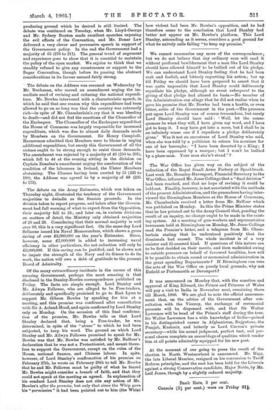The War Office has given way on the subject of
the reduction of the Royal Small Arms Factory at Sparkbrook. Last week Mr. Bromley-Davenport, Financial Secretary to the War Office, informed Mr. Jesse Collings that a "final decision" had been reached, and that no hope of revising it could be held out. Finality, however, is not associated with the methods of the present Administration, and the gunmakers having inter- viewed the Birmingham Members at the House of Commons, Mr. Chamberlain received a letter from Mr. Balfour which was published on Monday. In this the Prime Minister states that he has pointed out to the Army Council that, pending the result of an inquiry, no change ought to be made in the exist- ing system. At a meeting of gun-workers and representative townsmen held at Birmingham on Monday, Mr. Jesse Collings read the Premier's letter, and a telegram from Mr. Cham- berlain stating that he understood positively that the dismissals had ceased. The whole incident is of a very sinister and ill-omened kind. If questions of this nature are to be first decided on their merits, and then undecided owing to outside pressure on behalf of favoured localities, how will it be possible to obtain sound or economical administration in the great spending Departments ? If Birmingham can veto the acts of the War Office on purely local grounds, why not Enfield or Portsmouth or Devonport P










































 Previous page
Previous page